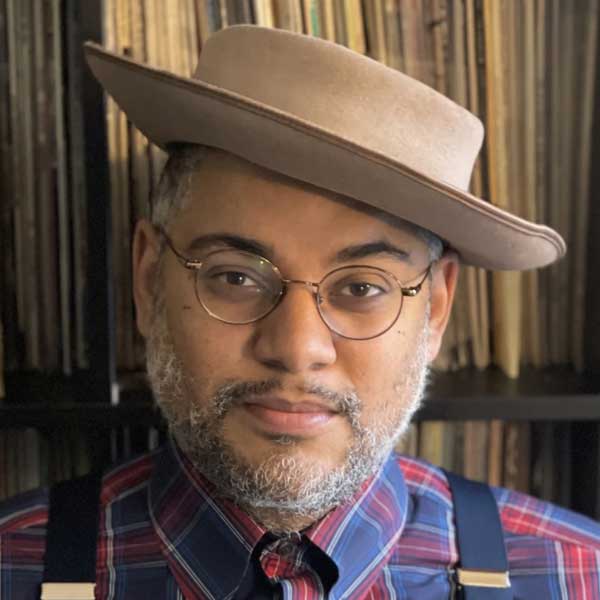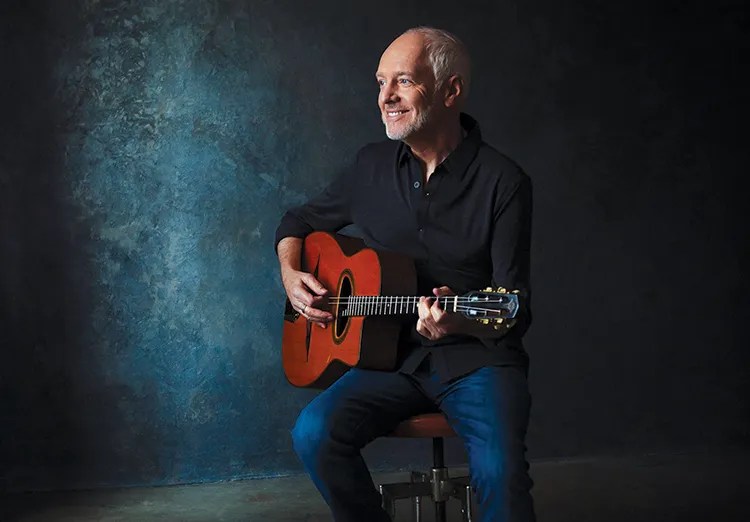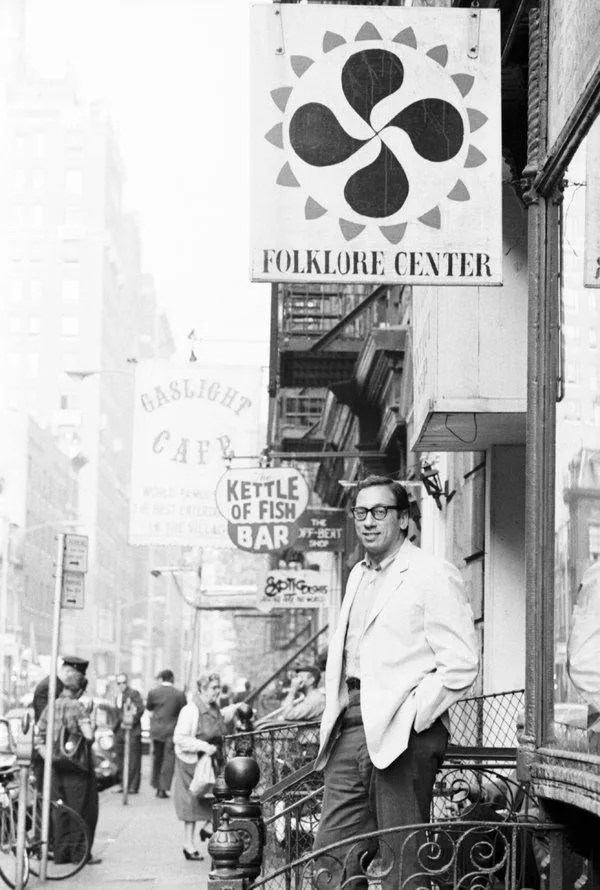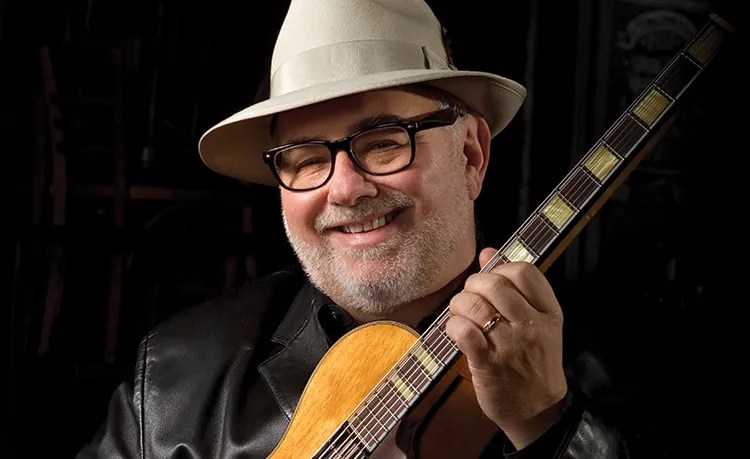Jerron Paxton, Tray Wellington, and Yasmin Williams Reflect on Expanding the Boundaries of Black Country Music
The revival of Black country music has reached a new milestone and become more mainstream than ever. When I first performed as a soloist in the early 2000s, Black country music was vastly underrepresented. I had the fortune of leading the Carolina Chocolate Drops, the first Black string band to play the Grand Ole Opry and win a Grammy for Best Traditional Folk. My 2018 solo album, Black Cowboys, also sparked renewed interest in Black country music, which continues to resonate today.
Now, after 20 years in the music business, I am thrilled to see new voices pushing the genre forward and expanding the definition of country music. When Acoustic Guitar invited me to organize a roundtable on black Country, I immediately thought of Yasmin Williams, Tray Wellington, and Jerron Paxton—three exceptionally talented artists who represent different aspects of American roots music.
I’ve always been a fan of Williams and her mesmerizing progressive folk guitar style. Recently, I was a featured artist on her album Acadia. Trajan “Tray” Wellington, with his album Detour to the Moon, is making waves in bluegrass with his lightning-fast, jazz-inflected, three-finger Scruggs-style banjo. I’ve also featured him in my band Shultz’s Dream, which celebrates Black contributions to bluegrass. Jerron Paxton’s latest release, Things Done Changed, evokes the rustic sounds of the Great Migration, moving from the rural South to Los Angeles and back again.
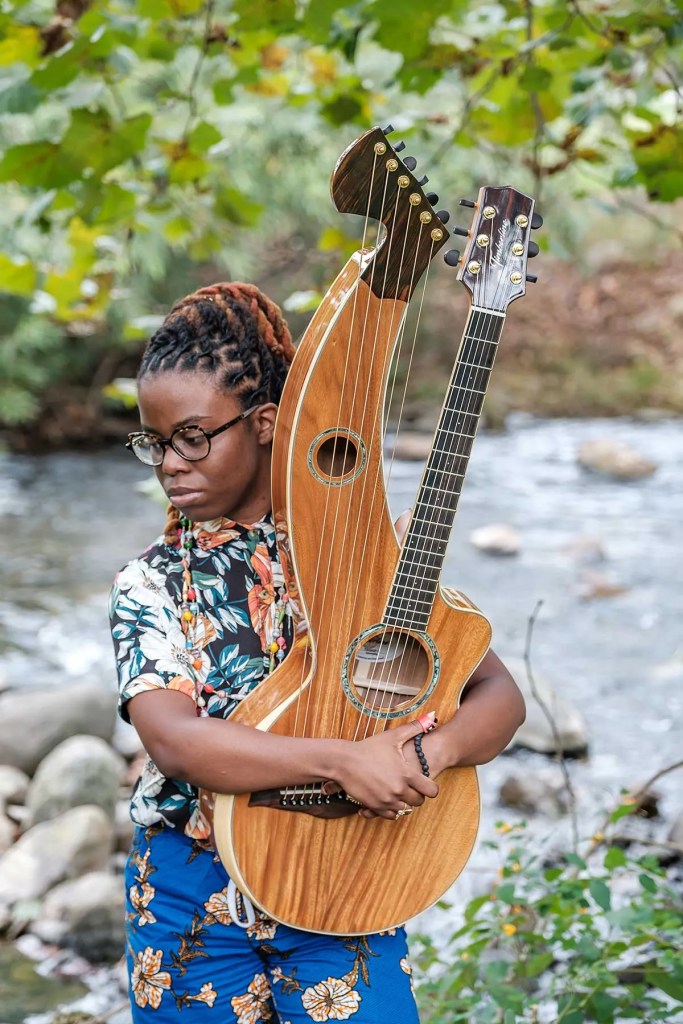
I recently enjoyed an extended Zoom conversation with Paxton, Wellington, and Williams while they were on tour. Here are the highlights from our discussion, edited for clarity, where we talk about traditions, influences, and redefining country and Americana roots music.
I want you all to take a moment to describe your music. I’ll start with you, Yasmin. How would you describe what you’re putting out there in the world?
Yasmin Williams: I’d say my music is rooted in the folk idiom, but I wouldn’t call myself a traditional folk artist in the more rigid sense. What I try to do is expand people’s notions of what the guitar can do and also expand their ideas of what folk music is—or what it can be. For me, folk music is really the people’s music, so that means it can take many forms. Hip-hop can be folk music, Hindustani raga can be folk music, and, of course, more traditional folk styles are part of that, too. I like to incorporate all the different kinds of music I’ve grown up with or learned about over the years. So, I would say my music fits into a more expansive folk category, with a lot of other influences thrown in.
It’s interesting how you use the guitar as a bridge between so many different styles. Tray, how would you describe your music? How are you presenting your work in today’s musical landscape?
Tray Wellington: I grew up in Ashe County, in the mountains of North Carolina, and bluegrass is what I was surrounded by. But like Yasmin, I’m always trying to be expansive with my music, pushing the boundaries of what bluegrass can be. My goal is to reach a wider audience, especially in terms of demographics. Bluegrass and folk music have traditionally had a pretty narrow audience—often predominantly white—and I want to get the music out to more people, especially more people of color.
ADVERTISEMENT
Right now, I’m in two different bands. I have my own group, the Tray Wellington Band, which is more focused on original compositions. We play progressive bluegrass, but we also incorporate elements of jazz, hip hop, and blues—different subgenres of folk music. Then there’s New Dangerfield, which I started in 2023 with Kaia Kater, Jake Blount, and Nelson Williams. That’s an all-Black string band, and we play old-time string band music, but with a lot of our individual influences mixed in. I come from a bluegrass and jazz background, Jake comes from an old-time background, Kaia from old-time as well, and Nelson has a New Orleans jazz influence, so it’s a really rich combination of sounds.

Jerron, how would you describe your music? What’s your approach to creating and performing?
Jerron Paxton: That’s always a tricky one for me, but I think the best way I’ve found to describe my music is as Black folk music in the broadest sense. I try to bring in as much as I can under that umbrella, from the earliest types of banjo music to more modern influences like jazz and blues. It’s not just about one genre—it’s really about collecting different sounds and traditions, things that I find beautiful or meaningful. If something feels culturally significant, I want to explore it. So for me, it’s about finding new ways to understand my own culture through the music I play. And it’s not just about preserving traditions—it’s about adding my own interpretation and voice to them and finding new ways of understanding my culture.
That’s a great way to define it. Let’s go back to Yasmin for a moment. You mentioned earlier that you didn’t grow up with traditional folk music. When did you first become aware of the tradition you’re now part of? Was there a moment when everything clicked for you, or was it more of a gradual process?
Williams: There was a defining moment for me when I discovered Elizabeth Cotten. I saw a video of her playing “Vastopol,” and it was like everything in my musical world changed. Like I said, my background was more in hip-hop, jazz, gospel, and go-go music, which is from my hometown area. Here was a Black woman playing her own guitar tunes, and it was just so inspiring. That led me down the rabbit hole of exploring folk music, reading books about it, and learning about Appalachian music, Black banjo traditions, and so much more. I felt like I had missed out on this whole tradition, and I was trying to catch up.
Buying my first banjo felt like coming home in a way. It was incredibly natural for me to play it, even though I hadn’t grown up with the instrument. Now, looking back, I think there was something ancestral there—something about my family’s past that I wasn’t consciously aware of, but that had always been inside me.
Tray, did you have a similar moment that guided you toward the path that you’re on now?
Wellington: My musical journey started when I was 14 years old. In Ashe County Middle School, they actually offered a class on mountain music. At the time, I was more into electric guitar, playing blues and Jimi Hendrix and that kind of thing. But in that class, I discovered Doc Watson for the first time, and that was my introduction to roots music. I found one of my grandpa’s CDs of Doc Watson, and I remember being blown away by his guitar playing. That was the moment that made me want to start playing traditional music.

Then I joined this mountain music club at school, and one day I heard a banjo for the first time. One of the instructors played it, and I was like, “What is that instrument?” It was so different from anything I’d heard before, and I immediately wanted to learn it. I begged my mom for a banjo, and not long after that, I started taking lessons. At that point, I didn’t know anything about the African roots of the banjo—I just thought it was a mountain instrument.
As I got deeper into my musical journey, I started learning more about the history of the banjo and its connection to Black folk music. That realization hit me in 2019 when I watched Throw Down Your Heart, the Béla Fleck documentary where he goes to Africa and discovers the roots of the banjo. This was shortly followed by a friend of mine telling me about the Carolina Chocolate Drops. That’s when I started to really connect with the idea that I was part of this larger tradition of Black string band music.
Jerron, was there a particular moment you found that you wanted to become more active in this world of roots music?
ADVERTISEMENT
Paxton: My first introduction to music was really just hearing my grandmother sing around the house. Music was always part of our home, and it wasn’t separated by genre. We’d have Marvin Gaye, James Brown, and all that playing right alongside Lightnin’ Hopkins, Muddy Waters, and the old blues guys. It wasn’t until later that I realized how special that was.
One memory that stands out for me was hearing Henry Thomas when I was a kid. We were playing hide and seek in my auntie’s backyard in Compton, and I heard his music coming from this little record player. I stopped playing the game and just stood there listening. I’d never heard anything like it before, and it really stuck with me. Later, my grandmother told me stories about her father, who played banjo. She wasn’t a musician herself, but she passed on the love of that music to me. She’d tell me, “I’ll give you the seeds, but you’ve got to go out and find the rest.” That was a huge influence on me—exploring the music my ancestors played and bringing it into the present. It wasn’t so much a single moment for me, but more like a constant thread running through my life.
You’re all multi-instrumentalists, and you’ve explored various stringed instruments in your careers. Yasmin, you play both guitar and banjo—how do these instruments interact for you?
Williams: That’s a tough one because, honestly, I feel like the guitar and banjo occupy very different spaces in my mind. Guitar is my main instrument, and it takes up a lot of my time, but I’ve been making more time for banjo lately. Playing banjo has actually made me approach the guitar differently, especially in terms of rhythm and syncopation. Banjo has a certain rhythmic drive, particularly with that fifth string, that has definitely influenced how I think about guitar.
I use a lot of open tunings on guitar, and that made it easier to transition to banjo, especially since I’ve been playing open D and open G on guitar for years. Even though there are similarities in the tunings, the two instruments still feel like they’re coming from different worlds. I’ve also been trying to incorporate into my banjo playing some of the lap-tapping style I use on guitar, and that’s been fun to experiment with. Overall, I think the guitar and banjo are still having a conversation in my mind—they haven’t fully merged yet.
Tray, you started on electric guitar before moving to banjo. How has the battle between those instruments played out for you?
Wellington: I started on electric guitar, but I wasn’t very good at it! When I picked up the banjo, it felt much more natural to me, so I ended up putting the guitar down for a while. I focused entirely on banjo for a few years. Then, when I picked guitar back up, it was like I had to relearn everything. Flatpicking was especially tough for me. I remember trying to play with a flatpick after not touching a guitar for a couple of years, and it just felt wrong. So I switched to playing with a thumbpick, which is more like how I play banjo.
Eventually, I got back into electric guitar, and studying jazz guitar really helped me improve on both instruments. I took lessons from jazz guitarist Mike Baggetta, and he showed me some techniques for moving around the neck more efficiently. That opened up a lot of new possibilities for me on the banjo. I started incorporating some of those jazz ideas into my banjo playing, and it really changed the way I approached the instrument. Switching between guitar and banjo during performances can still be tricky, though. It feels like my brain has to rewire itself every time I pick up the other instrument.

Jerron, you’ve been incorporating different banjo styles into your music, particularly with the lower-pitched tackhead banjo [a banjo with its head held in place by tacks, instead of hoops and hooks]. How does that compare to standard banjo, and how do you balance the guitar-banjo relationship?
ADVERTISEMENT
Paxton: I guess I’ve been lucky in that I’ve never seen much conflict between the two instruments. Banjo came first for me, and guitar followed naturally. With banjo, I started out playing a standard modern-pitched banjo, but over the years I’ve gravitated toward the lower-pitched tackhead banjos. Those give me a deeper, earthier tone that I love, especially for older styles of music. The tackhead banjo is closer to what Black folk musicians would have been playing in the 19th century, and that sound really resonates with me. It’s a completely different feel from the modern bluegrass banjo, which is tuned higher and has more of that metallic ring. For me, the banjo and guitar are like two sides of the same coin. They’re both stringed instruments, but they speak different languages. I like to let each instrument do what it does best, and I don’t try to force them into the same mold.
Over the past few years, we’ve seen a lot more conversations about the role of Black artists in country and roots music. Projects like Beyoncé’s Cowboy Carter and Lil Nas X’s “Old Town Road” have sparked a lot of discussion about Black representation in country music. Yasmin, I know you wrote an article for The Guardian about this topic. How do you feel about it now, several months after Cowboy Carter’s release?
Williams: I still feel a lot of what I wrote in that article, but my thoughts have evolved a bit. My main hope is that Black country artists don’t fall into the trap of trying to commercialize the movement too much. I think there’s a danger in trying to fit into the mainstream country industry, which has its own set of commercial expectations. What I hope for is that this movement can help all of us—not just a select few who get pushed to the forefront.
I also think it’s important to make a distinction between projects that are made in good faith and those that are more about marketing. For example, I’m not sure that Cowboy Carter was really done in the spirit of reclaiming Black country music. I’m not saying it didn’t have an impact, but I don’t think it made the lasting cultural shift that some people expected. For me, the real work is being done by artists like Tray, Jerron, and yourself, who are genuinely contributing to the Black roots and country movements. I just hope the movement doesn’t lose its integrity.
Wellington: I’ve been thinking a lot about this, especially over the past few months. I agree with Yasmin that authenticity is really important. One of the things that draws people to country and roots music is that it speaks to real-life experiences—hard work, love, loss, all the struggles we go through. When you start commercializing it, you run the risk of losing that authenticity. Like, for me, hearing someone sing about driving a Lexus up to a bar isn’t relatable to the people who are traditionally drawn to folk or bluegrass.
I think it’s important to stay rooted in the history of Black folk and country music. That’s why my album Black Banjo was so personal to me. I wanted to honor the traditions of Black string band music, but also push the boundaries and create something new. It’s about finding that balance between honoring the past and moving forward.
ADVERTISEMENT
Jerron, how do you see the commercialization of Black country music, and where do you think it’s heading?
Paxton:I’m not as involved in the mainstream music world, so I don’t think too much about what’s happening in commercial country music. A lot of popular music today doesn’t speak to me because it feels disconnected from the musicality I value. When you look back at the roots of country or folk music, you see people who really knew their instruments and knew how to use them to tell a story. That’s what I try to bring into my own work. Today, it feels like there’s a lot of poetry set to beats, but not as much depth in the music itself. I think the focus needs to shift back to the craft of making music. That’s where the real substance is, and that’s what I’m most interested in.
Yasmin, Tray, Jerron, thank you all so much for being part of this discussion. You’ve each brought such valuable insights, and I’m excited to see where your music takes you next. Let’s keep the conversation going.
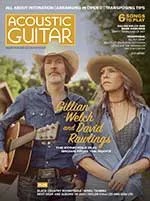
This article originally appeared in the January/February 2025 issue of Acoustic Guitar magazine.


